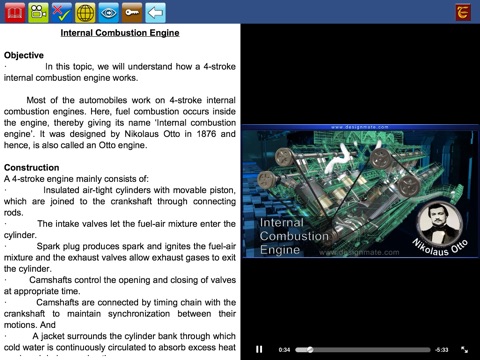
Eureka_Internal Combustion Engine
In this topic, we will understand how a 4-stroke internal combustion engine works.
Most of the automobiles work on 4-stroke internal combustion engines. Here, fuel combustion occurs inside the engine, thereby giving its name ‘Internal combustion engine’. It was designed by Nikolaus Otto in 1876 and hence, is also called an Otto engine.
Working of an ideal 4-stroke engine
The 4-stroke engine is given its name because every cycle of this engine consists of 4-strokes, that is, intake stroke, compression stroke, power stroke and exhaust stroke, which keep repeating one after the other. The PV diagram gives us the graph of pressure versus volume during each engine cycle.
The engine cycle begins when the piston is at its top position, called Top Dead Centre or TDC and both the valves are closed.
Intake stroke
During this stroke, the intake valves open and the fuel air mixture, called charge, enters the cylinder at near atmospheric pressure. The piston descends from TDC towards the Bottom Dead Centre or BDC of the cylinder and the volume of charge increases. As the intake valve is open, the pressure and temperature of charge inside the chamber remain constant. When the piston reaches BDC, intake valves close. The cylinder is full of fuel-air mixture at atmospheric pressure.



